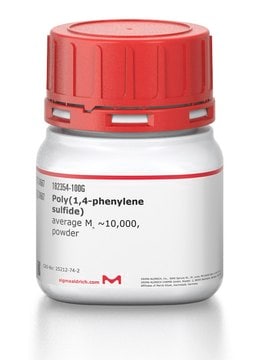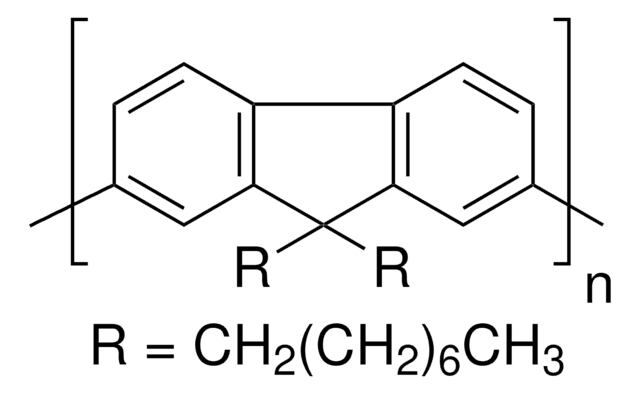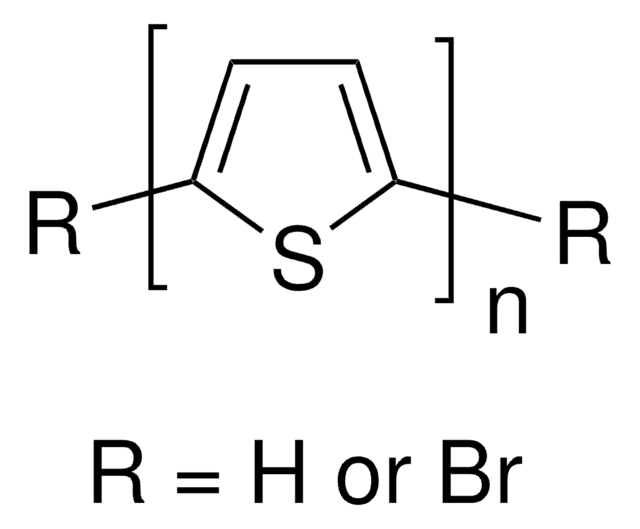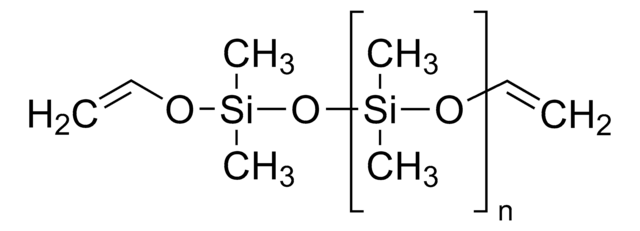937274
Poly(propylene sulfide)
average Mw 15000
Iniciar sesiónpara Ver la Fijación de precios por contrato y de la organización
About This Item
Productos recomendados
Agency
suitable for controlled release
Nivel de calidad
Formulario
viscous liquid
mol peso
average Mw 15000
color
colorless
aplicaciones
advanced drug delivery (tissue engineering, medical devices)
temp. de almacenamiento
2-8°C
Descripción general
Poly(propylene sulfide) (PPS) is a thermoplastic polymer that has shown potential for use in various biomedical applications due to its biocompatibility, biodegradability, and tunable mechanical and chemical properties.
Aplicación
One promising application of PPS is in drug delivery. PPS nanoparticles can be synthesized and loaded with drugs, providing sustained release and targeted delivery to specific tissues or cells. PPS also has good stability in biological environments, which is important for maintaining drug efficacy during storage and delivery.
PPS has also been explored as a material for tissue engineering. Its biocompatibility and ability to be tailored for specific mechanical and chemical properties make it a potentially useful scaffold material for various tissue types, including bone and cartilage. PPS has also been shown to support cell attachment and growth in vitro.
In addition to drug delivery and tissue engineering, PPS has also been investigated for use in medical devices such as catheters and sutures. Its chemical resistance and low toxicity make it a potential alternative to traditional materials like silicone and nylon. Overall, PPS has shown promise for various biomedical applications, and ongoing research is exploring its potential in areas such as wound healing, cancer therapy, and regenerative medicine.
PPS has also been explored as a material for tissue engineering. Its biocompatibility and ability to be tailored for specific mechanical and chemical properties make it a potentially useful scaffold material for various tissue types, including bone and cartilage. PPS has also been shown to support cell attachment and growth in vitro.
In addition to drug delivery and tissue engineering, PPS has also been investigated for use in medical devices such as catheters and sutures. Its chemical resistance and low toxicity make it a potential alternative to traditional materials like silicone and nylon. Overall, PPS has shown promise for various biomedical applications, and ongoing research is exploring its potential in areas such as wound healing, cancer therapy, and regenerative medicine.
Características y beneficios
- Biocompatible
- Biodegradable
- Tunable mechanical and chemical properties
- Ideal for sustained release and targeted delivery
- Chemically resisitant and low toxicity
Código de clase de almacenamiento
10 - Combustible liquids
Clase de riesgo para el agua (WGK)
WGK 3
Punto de inflamabilidad (°F)
Not applicable
Punto de inflamabilidad (°C)
Not applicable
Elija entre una de las versiones más recientes:
Certificados de análisis (COA)
Lot/Batch Number
It looks like we've run into a problem, but you can still download Certificates of Analysis from our Documentos section.
Si necesita más asistencia, póngase en contacto con Atención al cliente
¿Ya tiene este producto?
Encuentre la documentación para los productos que ha comprado recientemente en la Biblioteca de documentos.
Nuestro equipo de científicos tiene experiencia en todas las áreas de investigación: Ciencias de la vida, Ciencia de los materiales, Síntesis química, Cromatografía, Analítica y muchas otras.
Póngase en contacto con el Servicio técnico







